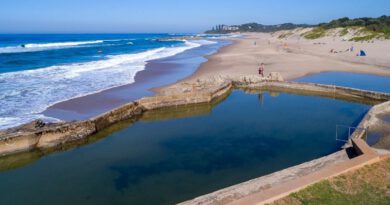Time is running out for e-tolls, yet the summons blitz kicks into high gear
The death of e-tolls has been predicted since they were launched in 2013, and yet they are still here. But it’s doubtful they can survive much longer, for four reasons:
- It will become a major political issue in the 2019 elections
- The Electronic Toll Collection (ETC) contract for the administration of e-tolls runs out in December 2019
- The ANC wants to win the election
- The threat of legal action against non-paying road users is not working.
ETC SA, which administers the e-tolls, is issuing 4 000 summonses a month to recover outstanding debts. Lawyers are certainly making money out of this, but no-one else.
E-tolls will become a major political issue ahead of the 2019 elections, as opposition parties have made it clear they intend to bludgeon the ANC for forcing through an ill-conceived and costly project without proper public consultation.
The ETC contract for the administration of e-tolls expires at the end of 2019. Sanral spokesperson Vusi Mona says the contract will be put out to tender before this time, but others believe political pressure will kill it outright. Among the alternatives being suggested is a 1c to 2c a litre fuel levy to finance a long-dated bond, which should allow Sanral to refinance its existing debt and get rid of the monthly administrative burden of collecting outstanding e-toll debts.
The government has given out mixed signals on the future of e-tolls, from which it is collecting just R60 million a month – a fraction of the amount predicted when the project launched in 2013. It is having to subsidise these to the tune of more than R400 million a year, while Gauteng freeways are increasingly congested and in need of further investment. That investment has been delayed because of the e-tolls boycott.
Recognising that e-tolls are a political liability, President Cyril Ramaphosa and Gauteng Premier David Makhura have voiced their concerns about their future, yet their words have been contradicted by others in the ANC.
Sanral’s recently released financial results for the year to March 2018 show it has billed road users R25.5 billion since 2014, of which nearly R15 billion has been impaired. This means it continues to behave as if the balance of R10.6 billion is still collectible, which is almost certainly an accounting fiction, bearing in mind that just R3.9 billion has been collected since the project launch. In terms of the Public Finance Management Act (PFMA), Sanral is not permitted to write off debts, even though in practical terms it will never recover this amount. In its annual report, Sanral acknowledges that any debt older than three years could be subject to prescription (ie. is non-collectible) in terms of the Prescription Act.
ETC has been issuing summonses to non-paying road users at the rate of 4 000 a month. ETC chief project officer Coenie Vermaak says the company is contractually obliged to recover outstanding monies from non-paying road users. “The summonses are seen as a last resort,” he says. “After an extensive engagement earlier this year, including some 13.5 million SMSs and letters of demand sent to road users, summonses are now being issued at a rate of around 4 000 per month.
“The legal process takes more time, but ETC did see an improvement in settlements, since the start of this campaign.”
E-toll revenue: actual versus budget
Source: Sanral (click to enlarge)
The Organisation Undoing Tax Abuse (Outa) reckons that just 30% of Gauteng road users are paying e-tolls, while overseas experience in similar projects suggests a 90% compliance rate is needed for financial viability.
Says Outa CEO Wayne Duvenage: “As far as we are concerned, the scheme has become defunct due to public resistance, all as a result of a poorly researched matter which resulted in a very unwise decision to proceed with this financing mechanism, whereby the scheme has become unmanageable and grossly inefficient. It makes no sense with the continuation thereof. And despite this development, government for some obscure reason has recently decided to continue with e-toll, after having said in March that an alternative solution is required. The provincial ANC structures in Gauteng have also made a decision that this scheme has no place in their province and must be scrapped.”
Manny de Freitas, shadow transport minister for the Democratic Alliance, says a 10c a litre addition to the fuel levy would have paid for the entire Gauteng Freeway Improvement Project (GFIP) by now, had it been implemented at the start. “Plus there would have been no administration costs and a 100% compliance rate.
“E-tolls have to go. There is no question of this,” he adds. “We can use the e-toll gantries for other things, such as traffic and speed monitoring. It’s unfortunate that the government did not think this through properly at the start. Now we will have to come up with another solution, such as 1c or 2c in the fuel levy, to pay for these roads. This will not be popular because the fuel price is already so high.”
De Freitas says he has tabled a private members’ bill in parliament that would force any future project of this nature to involve consultation with the provincial premier and city mayors, as well as members of the public, before being green-lighted. Sanral would also have to provide an alternative non-tolled route of decent quality.
Duvenage says national government, ETC and Sanral have indicated that they intend to summons every e-toll defaulter, a mind-boggling number probably well in excess of 1 million.
“This is a fight that government will never win in that it is virtually impossible to force this issue against the public at large. History shows that governments do not win battles of such magnitude of public dissent,” says Duvenage.
Source: moneyweb.co.za


